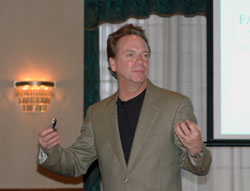Counselor says ‘Don’t be afraid to
share your grief with other people’

Dr. Alan Wolfelt, the founder and director of the Center for Loss and Life Transition in Fort Collins, Colo., was the keynote speaker for “The Wilderness of Grief: Finding Your Way,” on April 8, and “Living in the ‘Shadow of the Ghosts’ of Grief” on April 9 at the Community Life Center at Washington Park Cemetery in Indianapolis. (Photo by Mary Ann Wyand)
By Mary Ann Wyand
Share your grief with others.
In doing so, Dr. Alan Wolfelt explained, you are mourning—participating in the public expression of grief—which is so important in the healing process after the death of a loved one.
“You’re changed forever by the death of someone you love,” he said. “You’re transformed. You’re not the same person. I help people convert grief into mourning in ways that integrate it into their life.”
Survivors must learn how to open themselves to their brokenness, he said, acknowledge their sense of loss, and realize that the only way to integrate the loss into their life is to embrace and share it.
Wolfelt was the keynote speaker for “The Wilderness of Grief: Finding Your Way,” a grief ministry presentation for bereaved people on April 8, and “Living in the ‘Shadow of the Ghosts’ of Grief” for grief ministry caregivers on April 9 at the Community Life Center at Washington Park Cemetery in Indianapolis.
His talks were sponsored by the archdiocesan Office of Family Ministries, archdiocesan Catholic Cemeteries Association, and Flanner and Buchanan Inc.
A native of Lafayette, Ind., Wolfelt is the founder and director of the Center for Loss and Life Transition in Fort Collins, Colo., as well as a nationally known author, educator and grief counselor.
“Your priority right now is to give attention to your need to grieve and mourn,” he told bereaved people attending his April 8 presentation.
“Never minimize your need to mourn,” Wolfelt said, in spite of societal pressure to get on with your life.
“Psychic numbing” happens after the death of a loved one, he said, which is the body’s natural coping response.
Survivors must suspend their activities, Wolfelt said, in order to take the necessary time to grieve, mourn and honor the life of their deceased loved one.
“Hurting is part of healing,” he said. “Do exactly what you need to do.”
He said the Beatitudes recorded in the Gospel of Matthew remind us that, “Blessed are they who mourn, for they will be comforted” (Mt 5:4).
“Mourning is the shared response to loss, a shared social response of grief gone public,” Wolfelt said. “Crying is a form of mourning. You’re taking your grief that is inside [and expressing it] outside.”
He encourages people to journey through their grief—not around it—with help from six reconciliation needs:
- Acknowledge the reality of the death.
- Embrace the pain of the loss.
- Remember the person who died.
- Develop a new self-identity.
- Search for meaning in life.
- Receive ongoing support from others.
Center for Loss and Life Transition staff members surveyed several thousand people who have lost loved ones, Wolfelt said, and found that 90 percent of the respondents said they talk to dead people, which he said is a healthy way to cope with loss.
“Think of your grief as a wilderness, a vast, inhospitable forest,” he said. “You have to journey into it instead of around it because the only way to the other side is through the wilderness.”
(For more information about Dr. Alan Wolfelt’s grief ministry and books, log on to www.centerforloss.com.) †
